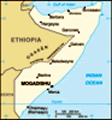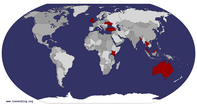COMING SOON HOUSE ADVERTISING ads_leader
Travelling is usually beset with issues: sometimes transport, sometimes scams, and sometimes officialdom. Almost all pass without much inconvenience or concern, for it a part of the travel experience. However, in Somaliland, I found myself in a very inconvenient situation due to a person who strove to make my time in their country a difficult one – and surprisingly he worked for the Ministry of Tourism.
The drama began when organising a travel permit through the Ministry of Tourism. My friend, Muhyadiin, had already secured a driver to take us to his home town of Gabiley to help him celebrate the birth of his first child. After arriving at the Ministry, I met a senior employee who became my nemesis – Abdisalam Shabeelle. A brief conversation in a darkened office followed.
“Where are you going?” Abdisalam asked.
“I’m visiting Gabiley with a friend tomorrow, and then the following day I wish to travel to Las Geel, Sheikh and Berbera”.
“Where are you staying?”
“At the Oriental Hotel.
“Then you must book with Dalmar Tours.”
I found it bewildering that he ordered me to use Dalmar Tours in the Oriental Hotel. I knew two other
tourists staying at the Oriental Hotel who were granted permits by Abdisalam without being instructed to use a specific operator.
“But my friend has organised a driver for me.”
“Who is this person, he could be anyone. You must book through Dalmar Tours”
“Well, I trust him. Can I book through another tour operator.”
“No, it must be Dalmar Tours.”
“I know I must get an SPU (Special Protection Unit armed officer) but why must I get it from Dalmar Tours?” This question was important because it is not uncommon for people to organise their own SPU directly from other government bodies.
“You must get it from Dalmar Tours.”
I was bewildered, but Abdisalam was insistent. I had not heard on blogs nor forums of this scenario. Knowing further discussion was pointless, I returned to the Oriental Hotel to inform Muhyadiin that I would not travel with him to Gabiley since the cost of hiring a car and driver with Dalmar Tours by myself for half a day was prohibitive.
Muhyadiin thought this a ridiculous situation – and immediately got to work. A couple of hours later, he found me at the
hotel and hurriedly blurted “Come with me” and we were driven an area on the outskirts of Hargeisa. A large man emerged from a gleaming car, it was Somaliland’s Minister of the Interior, Mr Ali Mohamed Waran Ade. He shook my hand, welcomed me to Somaliland, and after telling him how much I was enjoying his country, he grinned broadly and commanded “You are a Somalilander!” The Minister lent me a member of his personal elite bodyguard as SPU, stating that I could go “everywhere”, which meant everywhere on the planned itinerary – Gabiley, Las Geel, Sheikh and Berbera. A letter permitting me to travel could be collected later.
Having a personal bodyguard of the Minister of Interior as a SPU was very helpful as we passed through all checkpoints with a minimum of fuss. However, there was much fuss upon my return to Hargeisa.
On Monday morning, two days after returning to Hargeisa, a man approached me in the Oriental Hotel, “You are the person who came to my office to get the permit but did not come back.”
“Yes.” I replied. In hindsight, I should have said “No”.
With that he departed and returned
with two men, and it was then I remembered that man as Abdisalam. We sat at a table and the following conversation ensued. This transcript is from notes I made of the conversation afterwards. My previous job was a government investigator and my role involved writing conversation notes such as this. The other two attendees said nothing during the entire meeting.
“I hear you travel to Las Geel, Berbera and Sheikh – are you a tourist?” questioned Abidsalam.
“Yes, I am on a tourist visa.” was my response.
“You travel with no permit and no guard, you did not have a guard.”
“I had a guard.”
“Where?”
I showed all present a photo of the guard. Abidsalam paused before continuing. At this point, Ahmed from Dalmar tours passed the table.
“You did not do what I said, get a guard from here. He (pointing to Ahmed) was fined $50 because you did not travel with him.”
Ahmed later told me that he never paid the fine, but I was not to know at the time.
“Why did you fine him? It was nothing to do with him, he is a nice
man. I had already organised a guard, driver and permission – with my friend.”
“But you did not organise permit as I said. You must leave the country.”
“I must leave the country?” I said in utter bewilderment.
“Yes, you get your bags and you leave the country.”
I now had regained my composure.
“I will not.”
“I will call Immigration and they will take you to the airport.”
“They will not. I have my visa and my ticket to leave on Friday. I will leave on Friday.”
“No, you must go now.”
“I am only staying in Hargeisa to see friends. I will not go.”
“You think it is your country, but it is our country, you cannot do what you want to do.”
“I had permission from the Minister of Interior, I went and met him – I shook his hand. He gave me his personal bodyguard to use.”
“That makes no difference to me!” replied Abidsalam with a wave of his hands.
“Makes a difference to me, because he told me I could travel.”
“What is your name?”
“I will not tell

 Dr Farhan selling his wares - Hargeisa, Somaliland
Dr Farhan selling his wares - Hargeisa, Somaliland
Most afternoons Dr Farhan and I would sit together and talk about life.you. Why are you doing this? I am saying many nice things about Somaliland and how nice the people are and you threaten to take that all away because of what you are doing!”
“I don’t care.”
I couldn’t quite believe I heard this, so I stated again.
“You are hurting tourism by what you are doing!”
“I don’t care.”
I was momentarily stunned by that statement – a Ministry of Tourism employee not caring if they were damaging tourism. The conversation continued.
“Where is your letter?” demanded Abdisalam
“I do not have letter with me. I will call my friend to get letter here.”
“Give me your phone” and Abdisalam reached to grab my phone. I quickly moved the phone away. If Abdisalam took my phone, I would not have access to my Somaliand contacts. He was trying to isolate me from any support.
I called Muhyadiin, there was no answer, so I sent a message instead.
“He is not answering.”
“You must come with us to our office.”
This felt like another isolating tactic which would not happen. I strengthened my resolve.
“I will come
to the office once I speak to my friend.”
“Will you come to the office?”
“Wait until I speak to my friend, he has the letter.”
“See” Abdisalam said turning to his two colleagues, “he refuses.”
I increased the intensity of my voice, this opinion was not going unchallenged.
“No, I did not refuse, I said I must wait until I speak to my friend and I need someone I trust to translate for me. I did not refuse, do you understand.”
Abdisalam was silent, he eyes didn’t meet my gaze.
“Do you understand?” I sternly repeated.
Again silence and still he did not look at me.
“You are free to go.” Quietly stated Abdisalam, whilst still looking downwards.
“What?”
“You are free to go.”
With that I walked away, leaving the three men to talk amongst themselves. I retired to my room and thought about my next action. A few minutes later, Ahmed came to me to inform me that the tourism officials had left.
I was unaware that a man at an adjacent table overheard the conversation with Abdisalam and approached another Somalilander and said.

 Delicious fried potato meal - Hargeisa, Somaliland
Delicious fried potato meal - Hargeisa, Somaliland
Called "barador", it demonstrates the wonders of street food!“I listen to what he is saying, he is damaging our country.” Unfortunately, there was far more damage to come.
The following day, I was preparing to leave the hotel to collect my letter when I espied someone pointing to me from the periphery of my vision. I looked up and thought it was Abdisalam but could not be sure. A moment later, a man in a uniform approached me and asked “Are you Shane Dallas?” and when I replied “Yes” he handed me a piece of paper summoning me to the Immigration office. Abdisalam had done what he had promised.
I couldn’t read the Somali words. My name was spelt wrongly, but the passport number was correct. Ahmed assured me all would be fine, and I trusted him. So I was ushered onto the street under the inquisitive eyes of people I had met – this incident was certainly being noticed. I was placed into the centre back seat of a vehicle with immigration officials on either side and driven to their compound.
The youngest of the soldiers spoke decent English and made conversation. He stated “All would be fine” but when the conversation waivered,
he pointed to an imposing building on the right of the vehicle.
“See, that is the building where we put the bad people.”
“The prison?” I replied.
“Yes, the prison.”
Even though this young official was being friendly, pointing out the prison at a time like this was not the best.
After arriving at the high-walled immigration compound, I was led up a few flights of stairs to a room where a female secretary was working studiously. I was informed to wait for the director who was not in the building. After approximately ten minutes I was escorted to an office with a rectangular table and black chairs – the director was inside. I placed myself in a comfortable soft chair and two immigration officials sat across from me with another at the head of the table on my immediate right.
The atmosphere felt tense, that was mostly coming from me. With the director reading my notice and asking the other officers questions in Somali, he commenced with few introductory words about this being a “routine check”, before asking the first question, “How many times did you visit the Ministry of Tourism?”
“Once”
was my reply. The three immigration officials immediately shot intense glances at each other. Their reaction indicated that Abdisalam had provided different information. I now knew that if I just told my story, all would be fine.
For nearly thirty minutes, I explained my reasons for coming to Somaliland. I travel, write and photograph places and that I was not being paid to visit Somaliland. I was very impressed with the country and its people and I wanted to share that information with others – including at a speech in Malaysia the following month. I spoke calmly and confidently. Often the three officials would talk to each other in Somali, sometimes for prolonged periods. I felt comfortable that all was in my favour.
I knew my position was secure when the director looked through my 64 page passport containing many visas and stamps, “You travel a lot” and he paused at my Kazakhstan visa. “What was it like?” I proceeded to tell of the incredible city of Astana and the beautiful mountains near Almaty. I was then informed that I was free to return to my hotel. The director and an officer boarded a car and quickly left
the compound, but not until after I shook their hands and thanked them for their time.
I returned to the Oriental Hotel and fielded many questions. After recounting my story, the Somalilanders I had befriended were incensed, with one describing Abdisalam by stating “What an arsehole!” whilst others used stronger language. An interesting statement came from an elderly man who approached me in the market two days later. We had not met before, but I am easy to identify due to my fedora. He beckoned me closer and stated in a conspiratorial tone, “That man! That man, I saw what he did to you. He, he will go to hell!”
On the very rare occurrence that I write anything strongly negative in my blogs, I always give the other party a chance to provide an explanation. When a representative from the Gheralta Guides Association physically assaulted my guide in Ethiopia, I spoke to him afterwards. Due to the representative’s statements and sincere apologies, I provided his explanation and moderated my comments; everyone is entitled to mistakes.
However, there was no such regret nor explanation in this instance. Someone who personally knew Abdisalam rang him twice (I watched
him make the calls) to ask the reasons for involving the immigration authorities. Abdisalam told this person both times, “I’m busy, I’ll call you later.” That call was never forthcoming. I telephoned Abdisalam on several occasions but there was no answer. When he finally returned my call, this conversation occurred.
“Who is this?” he asked
“I was the tourist who you sent to immigration. Why did you do that?”
“You, you think this is your country. It is not.”
Then the line either dropped or he terminated the call.
Given that Abdisalam Shabeelle has shown no remorse, I named him; it is the first time I have named someone in a negative manner during more than a decade of blogging. This blog’s main purpose is to caution other travellers to avoid the spiteful Abdisalam – his arbitrary demands and attempt to isolate me should be of concern to others. Because I refused to comply with his order to book with a specific tour provider (which the locals allege is illegal), he sought assistance from immigration officials with the aim of deporting me – how pathetic.
The actions of one man will not destroy

 The photo I showed Abdisalam proving I had a guard
The photo I showed Abdisalam proving I had a guard
From left - Sa'eed Toor the driver, Muhyadiin, and the guard.the love of many.
The hospitality bestowed on me by the Somaliland people was extraordinary. The comments I received from the Somaliland Diaspora scattered across the world who read my blogs and social media has been inspiring. I have since delivered positive tales about the people, history and attractions of Somaliland in presentations across the world. I strongly encourage anyone with even the slightest measure of adventure resting within their body to see Somaliland for themselves and personally experience one of the friendliest and safest nations on earth.
COMING SOON HOUSE ADVERTISING ads_leader_blog_bottom
Tot: 0.092s; Tpl: 0.026s; cc: 16; qc: 32; dbt: 0.0393s; 1; m:domysql w:travelblog (10.17.0.13); sld: 1;
; mem: 1.3mb


















































Carole
non-member comment
Great story
Really interesting story, Shane. As I've worked in travel/tourism for over 20 years, I'm always surprised when people act as if they don't care what tourists think. Tourism brings in so much money to local economies. I just returned from a place in my home country of the U.S. which seemd to have that, "we don't care" attitude. In the end, it left me with an "I don't care to return attitude." I'm glad the locals spoke up for you and this man was not representative of his country.